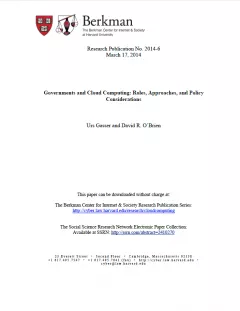
Governments and Cloud Computing: Roles, Approaches, and Policy Considerations
In this paper, Urs Gasser and David O'Brien synthesize findings from a multi-year cloud computing research initiative led by the Berkman Center in close collaboration with the NEXA Center for Internet & Society (Italy), Keio University (Japan), the Research Center for Information Law (Switzerland), the NCCR Trade Regulation project on digital technologies and trade governance (Switzerland), and the participants at our Cloud Computing Workshop series held in Cambridge, MA, Washington, DC, and Keio University in Japan.
Based on a review of a representative number of advanced cloud computing strategies developed by governments from around the world, including the United States, United Kingdom, the European Union, and Japan, we observed that these governments – mostly implicitly – have taken on several different “roles” with respect to their approaches to cloud computing. In particular, we identify six distinguishable but overlapping roles assumed by governments: users, regulators, coordinators, promoters, researchers, and service providers.
The paper explores each of these roles in detail using examples from our review of cloud strategies, and shares high-level observations about the roles as well as the contexts in which they arise. The paper concludes with a set of considerations for policymakers to take into account when developing approaches to the rapidly evolving cloud computing technologies and industry.
About the Cloud Computing Project
Since 2010, the Berkman Center has engaged in research and activities focused on understanding emerging issues and trends related to cloud computing. Led by Executive Director and Harvard Law School Professor of Practice, Urs Gasser, this initiative seeks to identify and evaluate the challenges and opportunities associated with cloud computing, with a particular focus on the technological, social, legal, and market contexts that shape it.
More information can be found on the project's website.
You might also like
- communityThinking of Algorithms as Institutions

